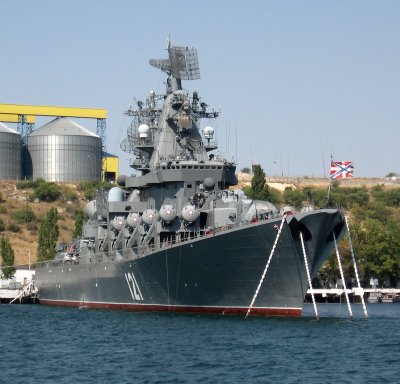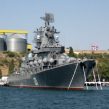
Maritime Security Weaknesses in the Black Sea
Publication: Eurasia Daily Monitor Volume: 6 Issue: 171
By:

Russian naval operations in August 2008 highlighted the security deficit in the Black Sea. As a littoral country, Russia misused the territory of another littoral country, Ukraine, as a staging ground for attacking a third littoral country, Georgia, using its Black Sea Fleet based in Ukrainian territory in Sevastopol (warships from Novorossiysk also participated in the operation). The Russian fleet landed thousands of troops on the Abkhaz coast, attacked Georgian coastal guard vessels, as well as shore targets further south in Georgia, and blockaded Poti. In that port, Russian troops blew up Georgian coastal guard cutters at the pier.
The Russian fleet’s actions violated Ukraine’s neutrality, which Russia otherwise professes to uphold vis-á-vis NATO. The naval operation also breached the 1997 basing agreements, which rule out any involvement in hostilities by the Russian fleet based in Ukraine.
According to Russian media accounts from naval sources in the war’s aftermath, the Russian naval group moved slowly from Sevastopol in the direction of Georgia, four or five days before the August 8 assault. Yet, no littoral or non-littoral country or organization reacted at the political level, before or afterward, to Russia’s naval operation.
In the war’s aftermath, Ukrainian President Viktor Yushchenko issued a decree requiring the Russian Black Sea Fleet command to provide advanced notification to Ukrainian authorities in each case when its ships and personnel exit and re-enter Ukrainian territory. The decree cites international law and the 1997 basing agreements as the basis for this requirement. Ukraine’s foreign ministry has repeatedly taken up the issue with its Russian government counterparts. Yet the Russian government and naval command have largely ignored it.
As part of its naval modernization program, Moscow hopes to buy a Mistral-class helicopter carrier from France. Announcing that intention, the Russian Navy’s Commander-in-Chief, Admiral Vladimir Vysotskiy, said: "In the conflict in August last year [against Georgia], a ship like that would have allowed the Black Sea Fleet to accomplish its mission in 40 minutes, not 26 hours which is how long it took us [to land the troops ashore]." The navy also hopes to acquire the license to build three or four Mistral-class ships in Russia. Moscow is preparing an international tender for France, the Netherlands, and Spain – states which also build helicopter carriers of this class- to compete for selling the ship and the technology to Russia (Interfax, September 11, 15).
According to Vysotskiy, the negotiations are in progress. Moscow apparently expects these NATO countries to enhance Russia’s military capabilities in order to intimidate its neighbors, after the same countries helped block Ukraine’s and Georgia’s membership action plans with the Alliance.
Moscow has recently introduced adjustments to the command arrangements for its Black Sea Fleet in Ukraine. The fleet shall be subordinated to the Russian North Caucasus Military District (ground forces), headquartered in Rostov-on-the-Don, in the event of "operational missions in the southern and southwestern directions." Prior to this change, the Russian Fleet in Ukraine was subordinated to the naval command at all times. The change is designed to integrate these naval forces with Russia’s ground forces for operations in the Black Sea region. By the same token this change erodes the provisions of the 1997 Russia-Ukraine agreements that ensure this fleet’s separation from the Russian ground forces and precludes the fleet’s involvement in hostilities (Nezavisimaya Gazeta, September 3; Interfax, September 11).
Russia openly questions Ukraine’s sovereignty in the Crimea while signaling that it will try to prolong the stationing of its fleet beyond the 2017 deadline. For that deadline to be observed, the fleet would have to begin the process of withdrawal by 2011-2012. However, Moscow is unwilling and international attention is also lacking. Even some leading Ukrainian proponents of the orientation toward NATO believe that the Alliance and the United States lack a strategy for securing Ukraine’s independence and territorial integrity, particularly in the case of escalating Russian pressures in the Crimea (Volodymyr Horbulin and Valentyn Badrak, Defense Express [Kyiv], September 11).
The existing arrangements for confidence-building and security in the Black Sea are proving inadequate to these challenges. The naval confidence-building undertaking BlackSeaFor and the Black Sea Economic Cooperation Organization (BSEC) are consensus-based groups, unable even to discuss officially, let alone deal with, hard-security challenges such as those relating to the territorial integrity of littoral countries.
Those groupings and arrangements were not designed to cope with those hard-security challenges; indeed such challenges were not initially anticipated, and went unaddressed after becoming manifest. In terms of naval security, the current situation in the Black Sea amounts to a Russian-Turkish naval condominium, with Turkey probably being the stronger side. The Turkish-led exercise Black Sea Harmony, held periodically with Russia in the southern Black Sea, also has no restraining impact on Russian behavior in the eastern and northern Black Sea.




